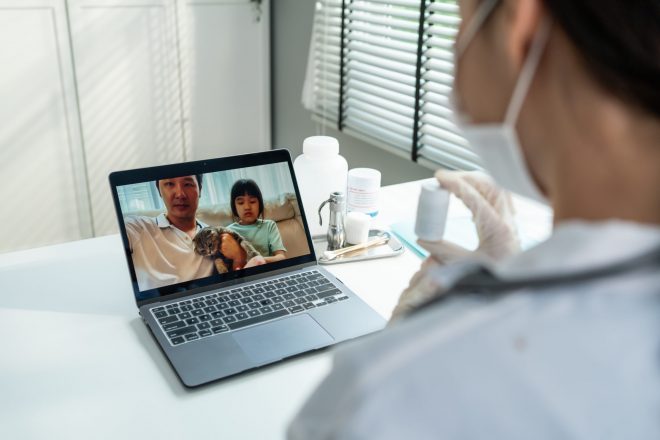How to Get Reliable Veterinary Advice from Home

Table of Contents
Now, more than ever, seniors are looking for alternative options for accessing healthcare and medical advice. This has led to an expanse of virtual care options. While you may be familiar with some of these tools for your own use, did you know that you can also have a video consultation with a licensed veterinarian whenever you have questions about your pet’s health and well-being?
Digital veterinary platforms like FirstVet are making professional pet care advice easily accessible to pet owners from the comfort of their home using a computer, tablet, or smartphone. This is a wonderful option for seniors, as many have embraced and are using this type of technology every day!
What You Need to Know Before Talking to a Vet Online
There are a few terms you should understand when deciding what type of care your pet needs.
Telehealth and virtual care are general terms used to describe the use of smartphones, tablets, and computers for communication between patients and medical professionals. The goal of telehealth services is to offer patients (or pet parents) reliable and trustworthy advice and tools to assist with patient care in a remote setting. This typically falls into two categories: telemedicine and teletriage.
Telemedicine is the classic term we think of when speaking to a healthcare provider online. However, in the veterinary world, telemedicine can only be performed by a vet if there is already an established veterinarian-client-patient-relationship (VCPR) in place. For this to occur, the vet must have performed an in-person physical exam on the animal within the past year. An existing VCPR allows the vet to diagnose (when applicable), prescribe medications, and give a prognosis for the pet’s condition. Telemedicine may be a service that your primary vet offers for rechecks, general questions and advice, prescription refills, and minor injuries or illness.
Teletriage consultations can be provided by veterinarians without a VCPR. Healthcare providers who offer teletriage services can give advice to pet parents from anywhere in the country. However, these vets cannot diagnose, prescribe medications, or give a prognosis for the pet’s condition.
Dr. Sheena Haney, an Administrative Veterinarian with FirstVet, states “The purpose of teletriage is to help pet parents make good, safe decisions about their pet’s condition. This is especially helpful if you aren’t able to get an appointment with your regular vet right away, or if you have difficulty traveling to the clinic with your pet. A teletriage vet can help you determine if your pet needs to be seen at an emergency hospital immediately or if it’s reasonable to manage your pet’s illness or injury at home.”
A recent survey found that 75% of pet owners who had a consultation with their veterinarian using remote or digital tools were satisfied or extremely happy.
How do virtual vet visits work?
Most online veterinary platforms allow you to create a free account so you’re ready to talk to a vet whenever the need arises. Download the appropriate app for your smartphone, tablet, or computer. Customers can then open the app and log into their account as long as they have WiFi available.
If you have a concern about your pet’s health or just a general question, you can schedule a video consult directly through your app. Most of the time, you can speak to a vet within 30 minutes! Depending on the service provider, you’ll be able to choose a time for your appointment, enter information about your pet’s condition, and upload any relevant photos. Some services charge a single, pay-per-use fee, while others offer monthly or yearly subscriptions for unlimited access to a veterinarian.
When it’s time for your appointment, open the app and wait for the vet to open the chat room or video call. If using a video service, be sure to have your pet close by. Your vet will want to say ‘hello’ and make a more thorough assessment when possible. Your vet can answer health or behavior-related questions or help you triage an illness or injury. If your pet needs diagnostics like blood work or x-rays or specific treatment such as surgery or IV fluids, the vet can help you determine if your fur baby needs to be seen at an emergency clinic or if they can wait to be seen by your primary vet during a regularly scheduled appointment.
How can a virtual veterinarian help my pet?
Telehealth vets are available to help with any type of pet, not just cats and dogs. A broad range of pet-related health concerns can be managed from the comfort of your home. At this time, vets on the FirstVet platform have been able to resolve 65% of pet parent concerns, meaning a large portion of in-person vet visits can be avoided by using an online telemedicine or teletriage service. And if you’re a senior with mobility concerns, have a health condition that limits travel, or if you have a pet that doesn’t travel well, this convenient service can bring peace of mind any time of day or night!
Examples of pet-related topics that can be discussed with your online vet:
General wellness and preventative care – Ask your vet about your pet’s vaccines, deworming, or upcoming neuter. You can even talk about proper nutrition, behavior concerns, or travel recommendations for dogs and cats.
Accident or illness – Your virtual vet can help you decide if your pet can be treated at home or if they should be seen by a vet in-person. Not sure if it’s an emergency or if it can wait? A virtual vet can help you make that decision.
Questions about surgery or chronic illnesses – Discuss your pet’s recovery from surgery, how to manage and identify signs of pain or infection, and how to keep incisions clean. Have questions about an upcoming surgery or other treatment? Online vets can talk to you about the tests and procedures your primary vet recommended so you can make educated decisions about your pet’s healthcare needs.
Hospice care – Online services allow you to seek veterinary advice without having to bring your senior pet into a clinic. Ask your virtual vet all your difficult questions regarding quality of life and end-of-life planning from the comfort of your home.
If your telehealth vet recommends that your pet be seen by their primary vet or an emergency vet, you’ll arrive at the clinic feeling prepared rather than overwhelmed. If your pet needs medication or specialized diagnostics, you’ll already have a good understanding of why those recommendations are being made!








